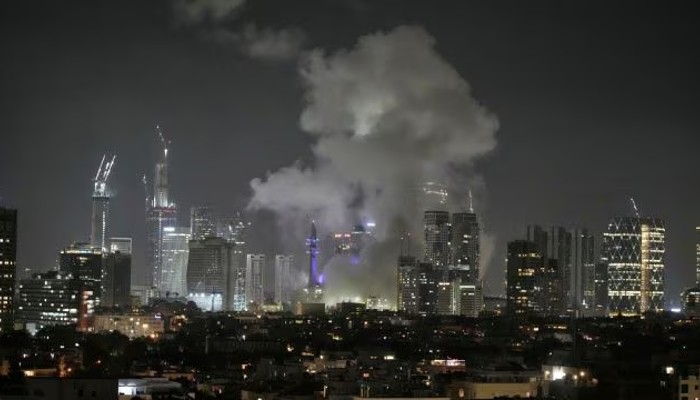Israel Intercepts Missile from Yemen as Houthis Target Main Airport

Representative image.
Israel intercepts missile launched from Yemen amid Houthi claims of targeting Tel Aviv’s Ben Gurion Airport, escalating regional tensions linked to Gaza war.
The Israeli military said it had intercepted a missile fired from Yemen on Sunday, after Iran-backed Houthi rebels claimed they launched two ballistic missiles at Israel’s main international airport near Tel Aviv.
Israel’s armed forces confirmed that air defence systems intercepted a missile launched from Yemeni territory on Sunday, shortly after sirens sounded in several areas of the country. The missile interception followed claims by Yemen’s Houthi movement that it had fired two ballistic missiles at Ben Gurion Airport, located near Tel Aviv.
The Houthi rebels, who control large parts of northern and western Yemen, said the attack was part of their ongoing campaign of solidarity with Palestinians amid the continuing war in Gaza.
"The attacks on Israel will continue until the blockade on Gaza is lifted," a Houthi spokesperson said in a statement released through the group's media channels.
The missile threat prompted temporary disruptions in parts of Israel, though no damage or injuries were immediately reported.
Escalation in Cross-Border Strikes
This is the latest in a series of long-range attacks launched by the Houthis against Israeli territory and commercial shipping in the Red Sea. The group has consistently targeted Israel with missiles and drones since the outbreak of hostilities in Gaza in October 2023, which began after a large-scale assault on southern Israel by Hamas, a Palestinian group with ties to the Houthis.
In response to previous missile attacks, Israel launched retaliatory airstrikes on strategic locations in Houthi-controlled Yemen. On Friday, Israeli aircraft struck the ports of Hodeida and Salif on Yemen’s Red Sea coast. The Israeli government stated that continued attacks from Yemen could lead to further action, including strikes against Houthi leadership.
The Houthi-run Saba news agency described Israel’s airstrikes as “aggression” and warned of a “painful response.”
According to regional observers, Israel also carried out strikes in the Yemeni capital Sanaa and targeted infrastructure such as power stations in response to a missile that previously landed near Ben Gurion Airport.
US Involvement and Regional Tensions
The ongoing missile launches have also affected global maritime security. Houthi attacks on Red Sea shipping lanes have drawn international attention, leading to military responses from the United States.
In early May, the US government brokered a ceasefire agreement with the Houthis intended to de-escalate maritime hostilities. However, that agreement did not include a cessation of attacks on Israel.
The Houthis, aligned with Iran and opposed to both Israel and the United States, have declared their military actions are in defence of Palestinians, specifically those in Gaza.
Washington has expressed concern over the potential for the Gaza conflict to trigger a wider regional war, given the involvement of non-state actors such as the Houthis, as well as state-backed groups operating in Lebanon, Syria, and Iraq.
Ben Gurion Airport is Israel’s main international gateway and a key national infrastructure site. While Israel’s Iron Dome and other defence systems have generally prevented direct hits, several incidents in recent months have underscored the growing range and capability of Houthi missile technology.
The Houthi movement, formally known as Ansar Allah, has received support from Iran and has fought a years-long civil war against a Saudi-led coalition in Yemen. Despite their relative geographic distance, the group has emerged as a major regional actor since the Gaza conflict began, highlighting the complex web of alliances and enmities that define Middle Eastern geopolitics.
Israel continues to monitor threats from multiple fronts, including from Lebanon-based Hezbollah and other armed groups across the region. The Israeli government has warned that continued attacks from Yemen could lead to broader military engagement in the Arabian Peninsula.
While Sunday’s interception prevented potential damage, analysts say the incident marks another step in the widening reach of the Gaza war and the mounting risks of a broader regional escalation.

Israel-Iran Conflict Escalates: Missiles Exchanged Amidst Mossad-Led Strikes
Tensions soar as Israel and Iran exchange missile strikes. Israel targets nuclear sites, Iran retaliates with ballistic missile barrage, raising war fears.
| 2025-06-14

Iran Summons UK Diplomat Over Arrests of Nationals in Terror Probes
Iran protests UK arrests of its nationals over terror charges, calling the move baseless and politically motivated. Three Iranians face national security charges.
| 2025-05-19

India and Iran Discuss Chabahar Port Amid Regional Tensions
India’s NSA Ajit Doval and Iran’s Ali Akbar Ahmadian discussed expanding cooperation on the Chabahar port and regional stability amid India-Pakistan tensions.
| 2025-05-19

Qatar Airways Profit Surges 28% to $2.1 Billion on Global Expansion
Qatar Airways reports a record $2.1 billion profit, driven by international investments and a landmark aircraft and engine deal with Boeing and GE Aerospace.
| 2025-05-19

Haj Flights Resume Between Saudi Arabia and Iran After Eight-Year Pause
Flynas restarts haj flights from Iran for the first time since 2015, signalling improved Saudi-Iran relations after a Chinese-brokered deal in 2023.
| 2025-05-19




